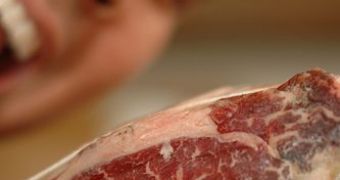An increased risk of developing bladder cancer has been linked to meat components related to processing methods, says a new study published online. The research is presented in CANCER, an online peer-reviewed journal of the American Cancer Society.
The findings might prove useful for understanding the part that a certain diet plays in cancer risks, as nowadays everything could eventually be causing the disease. This study focuses on the link between eating red and processed meat and an increased risk of several types of cancer.
Scientists have been conducting experiments on animals, and have concluded that certain meat compounds, including polycyclic aromatic hydrocarbons, heterocyclic amines and N-nitroso compounds – coming from nitrate and nitrite added to processed meats, might have something to do with this association.
For analyzing the relationship between the consumption of these meat-related substances and the risk of bladder cancer, scientists used information from questionnaires, about the type of meat consumed and the was it was prepared and cooked. At the study took part 300,000 men and women in between 50 and 71 years old, coming from eight US states. The study started in 1995/1996 and all subjects filled in questionnaires about their diet and lifestyle, their overall consumption of foods and drinks. During the next eight years' follow up, 854 people were diagnosed with bladder cancer.
After gathering all data, scientists concluded that diets with the highest amount of total dietary nitrite from different sources, and people who's diets were based on a high amount of nitrate and nitrite from processed meats, had 28-29 percent increased risk of developing bladder cancer. This conclusion adds up to previous studies that associated nitrate/nitrite consumption with high bladder cancer risk.
This NIH-AARP Diet and Health Study is one of the first prospective studies ever conducted, e! Science News specifies, and it was led by Amanda J. Cross, PhD, of the National Cancer Institute in Rockville and her colleagues. “Our findings highlight the importance of studying meat-related compounds to better understand the association between meat and cancer risk,” Dr. Cross said. “Comprehensive epidemiologic data on meat-related exposures and bladder cancer are lacking; our findings should be followed up in other prospective studies.”

 14 DAY TRIAL //
14 DAY TRIAL //